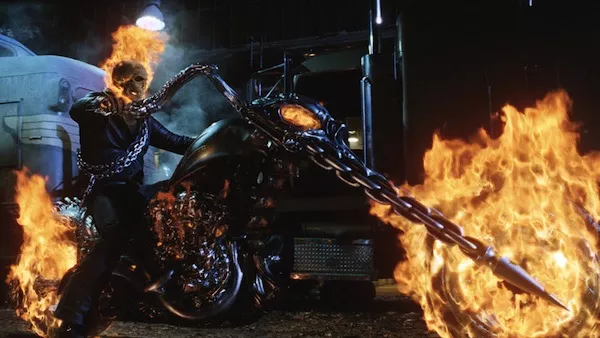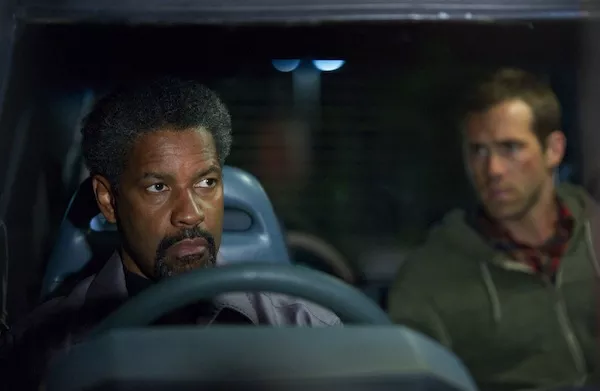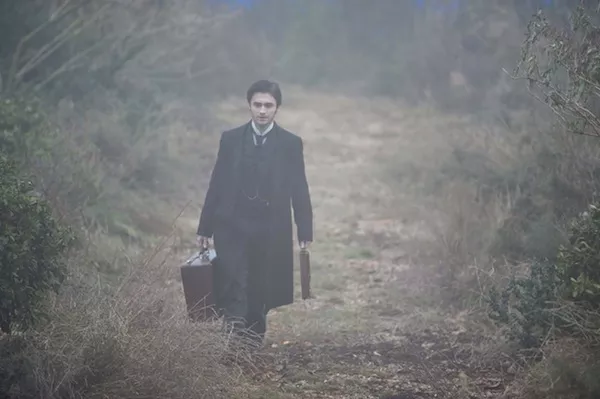Film Reviews
Tuesday, February 21, 2012
Film / Film Reviews Carolina kids feel the need for speed in Racing Dreams
Posted By Matt Brunson on Tue, Feb 21, 2012 at 3:23 PM
By Matt Brunson
RACING DREAMS (2010)
***
DIRECTED BY Marshall Curry
STARS Brandon Warren, Annabeth Barnes
A Spellbound or Mad Hot Ballroom for the NASCAR set, Racing Dreams ends up speeding past its niche market and working its magic on anyone with a rooting interest in the dreams and ambitions of this country's youth.
Like the aforementioned pair of documentaries, this one also corrals a group of kids and tracks their endeavors to become the best in their field of interest. In this case, it's the world of racing, with all three subjects top contenders in the World Karting Association's championship series. Twelve-year-old Josh Hobson of Birch Run, Michigan, is a brainy boy whose methodical, sensible approach to the sport repeatedly wins races. Eleven-year-old Annabeth Barnes of Hiddenite, N.C., is a spunky, charismatic girl who dreams of becoming the first female to win a major NASCAR race.
Both kids are interesting to follow, yet the movie belongs to the third focal point. Thirteen-year-old Brandon Warren of Creedmoor, N.C., initially seems the least complicated, a good-ole-boy-in-training whose reckless nature (on and off the track) might prove to be his undoing. Yet as we get to learn more about Brandon and his family — specifically, the grandparents who lovingly raise him and the deadbeat dad who turns up like an unwelcome wart whenever he's not behind bars — we come to realize that this story is the most involving, and most poignant, one in the movie.
The racing footage shot and edited by Marshall Curry and his team is exemplary (the first competition takes place at Charlotte Motor Speedway) and should thrill even those who aren't fans of the sport. Yet even these sequences take a back seat to the sagas of the children, all of whom retain pole position throughout this engaging picture.
(Racing Dreams will be screening on PBS at various times beginning this Thursday, Feb. 23. Go here for local programming details. The film is also available on DVD.)
Friday, February 17, 2012
Film / Film Reviews Friday Film Reviews: This Means War; The Secret World of Arrietty
Posted By Matt Brunson on Fri, Feb 17, 2012 at 2:44 PM
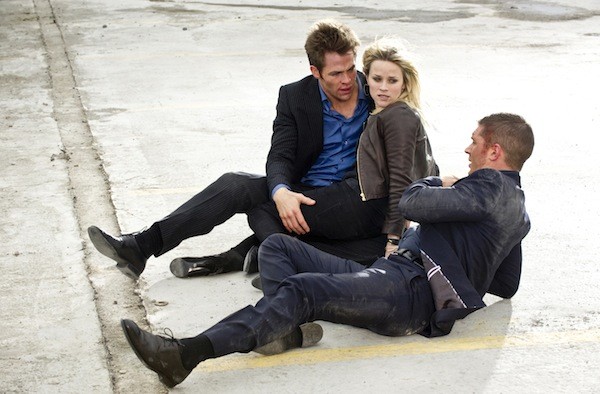
- Fox
- This Means War
Click on the title to be taken directly to the review.
Wednesday, February 15, 2012
Film / Film Reviews Newspaper series deals an Ace in the Hole
Posted By Matt Brunson on Wed, Feb 15, 2012 at 10:00 AM
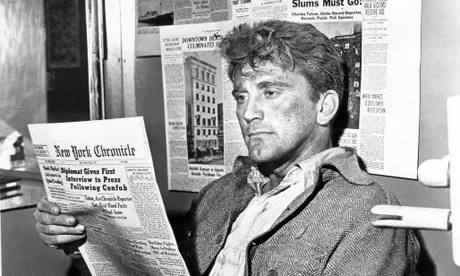
- Paramount
- Kirk Douglas in Ace in the Hole
By Matt Brunson
ACE IN THE HOLE (1951)
***1/2
DIRECTED BY Billy Wilder
STARS Kirk Douglas, Jan Sterling
One year after scandalizing Hollywood with his bilious classic Sunset Boulevard, writer-director Billy Wilder was up to his old tricks with Ace in the Hole, which did to journalism — and to the average American — what his previous picture had done to Tinseltown.
Remarkably topical, the film stars Kirk Douglas as Charles Tatum, a conniving newspaper reporter who ends up at a small New Mexico rag after getting fired from too many big-city publications. Tatum's hoping for that one story which will take him back to the majors, and he stumbles across it when he learns that a local (Richard Benedict) is trapped in a cave. Starting with this small item, Tatum expertly expands it into a nationwide sensation, a "human interest" piece that eventually draws the attention of other media, a sheriff running for reelection, American families who travel from miles away to gawk at the spectacle, and even entertainers of all stripes (admission is charged just to see the cave, and a Ferris wheel is merely one of the many carny activities set up on the site).
Cynical to its core, this powerful film is prescient in the manner in which it mirrors our nation's current fascination with cheap sensationalism and shallow journalistic practices. A box office flop (even when it was re-released under the title The Big Carnival), this earned an Oscar nomination for its script (penned by Wilder, Lesser Samuels and Walter Newman), while Jan Sterling, as the victim's icy wife, snagged the Best Actress prize from the National Board of Review.
(Ace in the Hole will be screened as part of the "Extra! Extra! Celebrating the Newspaper Picture" film series at 3 p.m. Saturday, Feb. 18, at ImaginOn. Admission is free.)
Monday, February 13, 2012
Film / Film Reviews Film Flashback: Ghost Rider
Posted By Matt Brunson on Mon, Feb 13, 2012 at 3:38 PM
By Matt Brunson
This Friday will see the release of Ghost Rider: Spirit of Vengeance, with Nicolas Cage reprising his role from 2007's Ghost Rider. Since this sequel isn't being screened in advance for critics, we offer CL's original write-up on its predecessor, which was mauled by reviewers but nevertheless earned $115 million from stateside audiences (although its $110 million budget meant it barely broke even here, with the foreign market once again having to come to the rescue). If this review reminds you exactly how much you disliked the original (after all, it's hard to find anybody who champions it), then for God's sake, do us all a favor and stay away rather than convince the studio of the need for a third GR flick starring Cage.
================
Is it possible that before making the big-screen version of Ghost Rider (*1/2 out of four), writer-director Mark Steven Johnson had never even read a Ghost Rider comic book? Yes, I know as well as anyone that faithfulness to the source material is a low priority when it comes to Hollywood, whether adapting Stan Lee or Lee Child. But Johnson, whose version of Daredevil wasn't quite as bad as the press made out, here botches what would have seemed to be a fairly manageable assignment.
The comics' original Johnny Blaze wasn't a joke-a-second character like Peter Parker or The Fantastic Four's Ben Grimm. He was more somber and serious, as one would expect from a biker who sold his soul to the devil (to save the life of a loved one) and then found himself living under a curse that transformed him into a flaming-skull creature whenever in the presence of evil. Of course, when you hire Nicolas Cage to star in your movie, it's safe to assume that camp was what was intended all along.
Cage, whose best film in recent years has been the hilarious Wicker Man re-edit on YouTube (check it out here; it has the power to brighten anyone's week), falls back on the eye-popping, head-rolling overacting that has turned him into this decade's Rod Steiger. Amazingly, though, he doesn't deliver the movie's worst performance; instead, he lands in the show position, right under Eva Mendes as the somnambular love interest and the mesmerizingly awful Wes Bentley as one of the least convincing — and therefore least threatening — villains of recent vintage.
On the plus side, the special effects are pretty cool, and it was inspired to cast Peter Fonda as Mephistopheles (Easy Rider, meet Ghost Rider). Otherwise, this is yet another comic book adaptation that goes up in flames before our very eyes.
Friday, February 10, 2012
Film / Film Reviews Friday Film Reviews: Pariah; Pina; Safe House; Chronicle
Posted By Matt Brunson on Fri, Feb 10, 2012 at 2:55 PM
Friday, February 3, 2012
Film / Film Reviews Friday Film Reviews: The Woman in Black; The Grey
Posted By Matt Brunson on Fri, Feb 3, 2012 at 2:52 PM
Film / Film News / Film Reviews Backtrack before next Back Alley offering
Posted By Matt Brunson on Fri, Feb 3, 2012 at 2:00 PM

- IFC Films
- A scene from the first Elite Squad
By Matt Brunson
Anyone interested in catching the Back Alley Film Series' screening of Elite Squad: The Enemy Within would be well-advised to spend the remaining time before then hunting down and watching its predecessor, 2007's Elite Squad. While it's not imperative to see the first film in order to enjoy the second, it is recommended, as it focuses on several characters who return for the follow-up. Beyond that, it's simply an excellent film — even better than its sequel — and it's a shame it didn't receive any sort of a proper release here in the States (surprisingly so, since writer-director José Padilha previously helmed the riveting documentary Bus 174 while co-writer Braulio Mantovani penned the Oscar-nominated script for City of God).
Elite Squad: The Enemy Within will be shown at 7:30 p.m. Thursday, Feb. 9 at Crownpoint Cinemas, 9630 Monroe Road. Admission is $8. Go here for more info.
Friday, January 27, 2012
Film / Film Reviews Friday Film Reviews: A Dangerous Method; Albert Nobbs; Haywire; Man on a Ledge; plus, Oscar nom analysis
Posted By Matt Brunson on Fri, Jan 27, 2012 at 2:50 PM
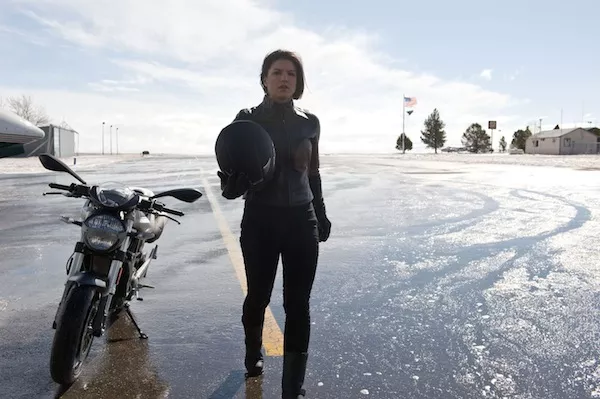
- Relativity Media
- Haywire
Click on the title to be taken directly to the review.
The Oscar Nominations: Extremely Shameless & Incredibly Dumb
Thursday, January 26, 2012
Film / Film News / Film Reviews Fact: Pulp Fiction to be screened next Monday
Posted By Matt Brunson on Thu, Jan 26, 2012 at 2:00 PM
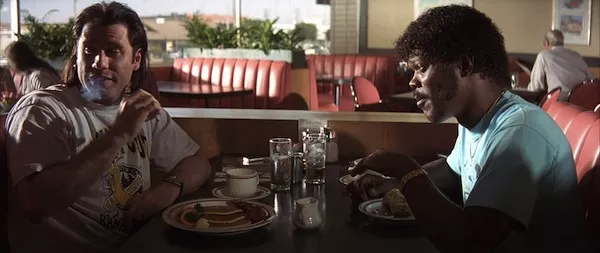
- Miramax
- John Travolta and Samuel L. Jackson
One of the crowning achievements of 90s cinema was also one of its most influential, spawning a decade's worth of shameless rip-offs, resuscitating John Travolta's dormant career, heralding the arrival of Samuel L. Jackson as a consummate actor, handing Bruce Willis one of his best parts ever, and providing enough subtext to choke Internet chat rooms and message boards for years to come (most prevalent question: What exactly is in that glowing briefcase?). Writer-director Quentin Tarantino's 1994 cause célèbre immediately became a direct challenge to creative complacency: Intoxicated on the heady fumes of its own art form, it employs a nontraditional, nonlinear form of filmmaking to interweave several vignettes all involving various members of a seedy underworld.
Pulp Fiction won the Palme d'Or at the Cannes Film Festival before enjoying a successful stateside run that culminated with seven Academy Award nominations (including nods for Best Picture, Travolta, Jackson and Uma Thurman); in the year of Forrest Gump, however, it managed to only win a solitary statue for Best Original Screenplay. ****
Pulp Fiction will be screened as part of The Light Factory's Cult Movie Monday series at 8 p.m. (doors open at 7 p.m.) Jan. 30 at Actor’s Theatre, 650 E. Stonewall St. Admission and popcorn are free; a cash bar is available. More details here.
Tuesday, January 24, 2012
Film / Film Reviews Sweet Smell of film screening
Posted By Matt Brunson on Tue, Jan 24, 2012 at 3:04 PM
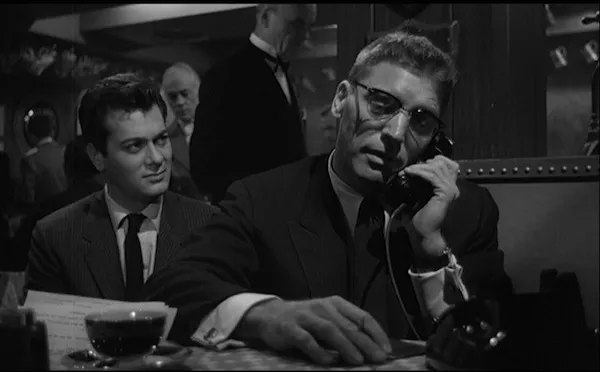
- MGM/UA
- Tony Curtis and Burt Lancaster in Sweet Smell of Success
By Matt Brunson
SWEET SMELL OF SUCCESS (1957)
***1/2
DIRECTED BY Alexander Mackendrick
STARS Burt Lancaster, Tony Curtis
Even a three-course meal consisting of lobster bisque, a medium-rare steak and crème brulee doesn't come close to matching the exquisite, juicy taste of the dialogue slung around in this riveting drama written by no less than Clifford Odets and Ernest Lehman.
Practically everything clicks in this brutal exercise in which unscrupulous press agent Sidney Falco (Tony Curtis) will do just about anything to curry favor with powerful newspaper columnist J.J. Hunsecker (Burt Lancaster). So when Hunsecker's sister (Susan Harrison) falls for a clean-cut musician (Martin Milner), J.J. becomes jealous (perhaps not since Scarface's Tony Montana has a movie character displayed such an unhealthy attraction toward his own sibling) and orders Sidney to drive them apart through malicious gossip and outright lies.
The contributions of two industry titans, cinematographer James Wong Howe and composer Elmer Bernstein, are key to the film's success — the jazzy score works in tandem with the evocative NYC location shooting — and while Curtis generally leaves me cold, his performance as Falco is arguably his greatest. Yet the rapid-fire dialogue is this film's truly astonishing component, from the classic lines (both from J.J. to Sidney) "I'd hate to take a bite out of you; you're a cookie full of arsenic" and "Match me, Sidney" to lesser known but equally impressive snatches of cynicism (I've always been partial to J.J. opining that "Sidney lives in moral twilight"). The film's only significant debit is its ending, which feels rushed, incomplete and therefore not entirely satisfying.
(Sweet Smell of Success will be screened as part of the "Extra! Extra! Celebrating the Newspaper Picture" film series at 3 p.m. Saturday, Jan. 28, at ImaginOn. Admission is free.)




